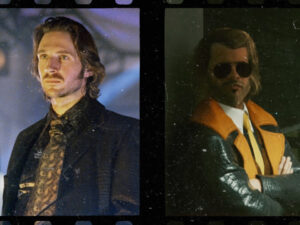Cut Scenes is Josh Wise’s regular column on the intersection between films and video games. This week, it’s Prey vs. The Truman Show.
We never shared in Truman Burbank’s naivety. We were primed from the off: a series of talking heads, from the actors playing Truman’s family and friends, let us in on the life-shaped lie he was cast in. His revelation, that his life was broadcasted on a global stage, was not ours, and the perverse thrill of The Truman Show is in his dawning realisation of us. We watch him, tingling with apprehension that he might notice us doing so.
Truman’s skepticism is sparked when a stage light falls from the firmament, whistles toward the earth, and smashes against the asphalt:
The opening of 2017’s Prey pulls a similar trick. When a researcher is savaged by a spidery menace, scientist Morgan Yu is drugged and wakes up back at home, only things aren’t as they once seemed. The baddies here, the Typhon, are a truly videogame concoction: like blackstrap molasses spooned into zero G and powered by sheer malevolence, their mimicry of environmental objects is a tense, theatrical mechanic, let down by simplistic AI of the whipping-running-leaping variety. They belong to no other medium than the videogame, just as Truman’s lighting fixture is impossible to separate from the realm of the film set.
The paranoia scene in The Truman Show has Truman, with Jim Carrey’s hatched-this-morning look on his face, slowly rejecting the world, awakening. As the years pass, since the film’s release in 1998, the scene picks up a new feeling: that of the avatar becoming aware of the open-world. Truman does exactly as we do, impugning the world he’s presented with in the most videogame way: he fucks with it. Slugging a technician with his satchel, halting traffic like Moses parting the red sea, looking for patterns in passersby: Truman takes on the role of a good QA tester, trying to break the game as best he can.
https://www.youtube.com/watch?v=WbqbPqYwsTM
At 4:20 in that clip, Truman comes across the first portal between worlds – an exposed film set lurking behind the back wall of an elevator in the Omnicorp building. It mirrors the moment, in Prey’s opening, where Morgan opens a wrench-bored hole between worlds, shattering the illusion of a San Franciscan skyline. A deeper unease sets in, stemming from the notion that, like Truman, Morgan might just sense the simulation; not just the set behind the glass, but us on the other side of the screen.
Toward the end of the film, Truman’s showrunner, Christoff, says to him, “I know you better than you know yourself.” To which Truman replies, “You never had a camera in my head.” The dumbfounding power of Prey’s early moments is that it does just that: it puts a camera in Morgan’s head, but we still don’t know him any better. As we later come to learn, it wasn’t Morgan that was duped at the start. It was us.
We began Prey truly naive. Before things even took a ghastly turn we were desensitised to the forehum of illusion. We sifted through the rum little details of Morgan’s apartment: the cookery books, E-mails, coils of wire and broken circuitry, the shower, that beckoning balcony beyond the glass. They were all props. But as Christoff says, as he peers into the camera, into us, “We accept the reality of the world with which we’re presented. It’s as simple as that.”












